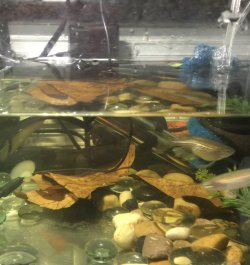OK, here we go.
First, that site. "Wendy" and "Brian" run it, and they claim to be "experienced fish keepers." That may well be true. Neither claims to have any professional ichthyological/biological training, and that is crucial if one is going to accept the more scientific information. I have kept fish for over 30 years now, but it has not taught me much of the science; this I have learned from the trained professionals who do know. Taking a look at their "information" it says Zebra danios attain 3 inches [SF has "usually 40-50 mm which is 1.5 to 2 inches], and can be kept in a 10g tank. Given the rapid swimming activity of this fish, even if it doesn't reach 3 inches, there is no where near sufficient space in a 10g. A 20g is insufficient. That probably says all we need to know about reliability.
SF has nothing about pairs mating/bonding for life, and that is something of sufficient interest/importance to keepers of this species that I would expect it to have been stated if true.
To your question about spawning. Fish living in the tropics spawn once the wet or rainy season is in full swing. They do this because the rains flood the watercourses to overflowing, into thousands of square kilometers of forest, where food is plentiful (insects, insect larvae, berries, etc) and space is so vast that predation is less than it would be in the watercourse itself. So the eggs and fry have a significantly better chance of survival. This intelligence is part of the evolutionary development of the species, and this is why we can "fool" the fish into spawning by replicating such conditions.
Fish detect atmospheric pressure. This may have more to do with it than cooler water (the rain) or slightly differing parameters (pH). What we do know is that such fish can be enticed more readily to spawn in an aquarium if you do a major water change with slightly cooler water on an overcast day. Feeding live foods is sometimes also necessary, though not for all species. The thinking behind this is that the fish have the inherent instinct (that evolutionary intelligence) that such occurrences are advantageous and they should reproduce. So they do.
Some fish react similarly to warmer water. I would have to dig into the species, but it may be much the same thing, only warmer rain than cooler, which is dependent upon the geography. It is a fact that the temperature of the watercourses in the tropical areas is relatively stable year-round, and even diurnally. There is no great shift from day to night or season to season (there are no seasons anyway!), as everything from daylight to temperature is basically consistent year-round. [Or at least it was until we messed it all up in the last 150 years.] Therefore, any slight temperature variation of a couple degrees becomes a much more significant event to the fish.


